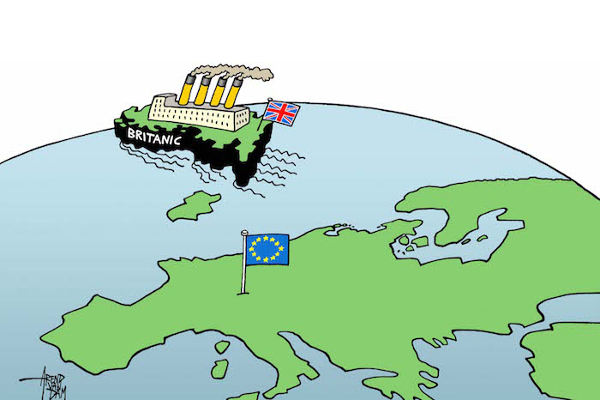

 The economic consequences of leaving the EU have been a central focus of the referendum campaign. As June 23 draws near, Jagjit Chadha, Paul Johnson and John Van Reenen bring together the conclusions from their research on the likely consequences, and reflect on some of the claims made.
The economic consequences of leaving the EU have been a central focus of the referendum campaign. As June 23 draws near, Jagjit Chadha, Paul Johnson and John Van Reenen bring together the conclusions from their research on the likely consequences, and reflect on some of the claims made.
First and foremost a vote to leave the EU would almost certainly make us financially worse off compared with staying in the EU, quite possibly by a substantial amount. Analysis by the CEP and NIESR suggests that were we to leave the EU, the economy would be between 1 per cent and 3 per cent smaller by 2020 and between 2 per cent and 8 per cent smaller by 2030 than if we stay in. A 1 per cent drop in GDP is a fall of £19 billion, equivalent to £720 for each household currently in the UK.
The reasons to expect lower national income if the UK leaves the EU are well-established – prolonged uncertainty, reduced access to the single market, and reduced investment from overseas. Each of these would be highly likely and the overwhelming weight of evidence is that each would be damaging for the living standards of UK households. Consequently , leaving the EU would, relative to staying in, be likely to result in:
- Lower real wages;
- A lower value of the pound –and hence higher prices for goods and services;
- Higher borrowing, lower public spending or higher taxes;
- In the short run, higher unemployment.
It is not just the research undertaken by our institutes that predicts these effects, but the work of almost all those who have looked seriously at this issue. In our lifetimes we have never seen such a degree of unanimity among economists on a major policy issue. The precise effect, in terms of a numerical percentage, is of course uncertain. But that we would be financially worse off outside the EU than in it is almost certainly true.
Considering some of the biggest economic claims made by each side in this campaign about what would happen if we were to vote to leave the EU:
- There would be £10 billion more to spend on public services and tax cuts.
- Households would be £4,300 a year worse off by 2030.
Uncertain – the effect might be bigger or smaller and will fall unevenly across households. And they would not be worse off than they are now. But households would in all likelihood be, on average, significantly worse off if we left the EU than if we stayed;
- The UK would be able to trade with other EU nations on equally good terms to those we currently have.
Almost certainly untrue. Membership of the single market on something like current terms might be available if we were to continue to make budget contributions and accept free movement of labour. It would not be available otherwise. Trade with EU countries would continue, but it would become more difficult and costly, there would be less of it, and we would be worse off as a result;
- There would be immediate big tax increases.
Unlikely. The public finances, even accounting for the return of the net contribution to the EU, would be badly affected as the economy would likely be smaller. That would require tax rises or spending cuts at some point. But our judgement is that the government would allow borrowing to rise in the short-term rather than implement further tax raises or spending cuts immediately.
Clearly non-economic arguments matter as well. Leaving the EU would allow us more freedoms over some aspects of sovereignty such as law-making and possibly greater control over immigration. There is a trade-off to be made. Voters need to make a judgment. That judgment should be informed by the fact that our research, and that of every reputable economic research organisation, suggests that leaving the EU would almost certainly harm our economic prospects.
Given the importance of this referendum we feel we need to reiterate that the CEP, the IFS and NIESR are all independent, impartial organisations which exist to conduct and promote high quality economic research. What we publish and say is not, and never has been, influenced by our funding.
None of our funding is dependent on being either pro-EU or pro-government –as our frequent vocal criticisms of each in the past should make clear. None of the three current directors of the organisations ever supported joining the Euro, nor did the organisations themselves.
___
Note: the above is taken from CEP’s press release, where you can find more information on sources.
About the Authors







So pure conjecture and a regurgitation of the project fear campaign material. I would have thought better of the LSE. a, suggestion doesn’t mean will. As wages are already rock bottom, and have not been growing for the vast majority for 10 years, being in the eu hasn’t helped, and is unlikely to given the influx of available employees supply and demand holds down wages. There is no credible claim that the value of sterling will go up or down, it does that anyway, and a reduction in value could, to use the word favoured by remain lead to an increase in exports more money coming in more jobs and a boost to the overall economy. Paying to less to the eu economic black hole will not lead to a cut of monies available for public services, another claim form the most inept chancellor in British history. House holds will only be worse off if we continue with todays economic plan of taking form the poor to give to the rich, and propping up a politically motivated currency in the eu. The £4,300 figure has proven to be one plucked out of the air, and is reliant on huge increase in taxation to not use on public spending apparently. The trade balance with the eu is a negative one, the idea that the eu would want to stop trading with its single largest customer, is risible, we are talking business’ here not jumped up failed politicians making a fortune for themselves by being a commissioner. Remain could lead to huge tax increases, because under Lisbon we have to adopt the euro and the bail outs will increase, as the whole project is already crumbling and failing. All in all this piece does not meet academic standards it is made form pure conjecture and regurgitation of “expert opinions” such as those of Gideon George Osbourne, and Neil, my pension depends on us remaining in, Kinnock.